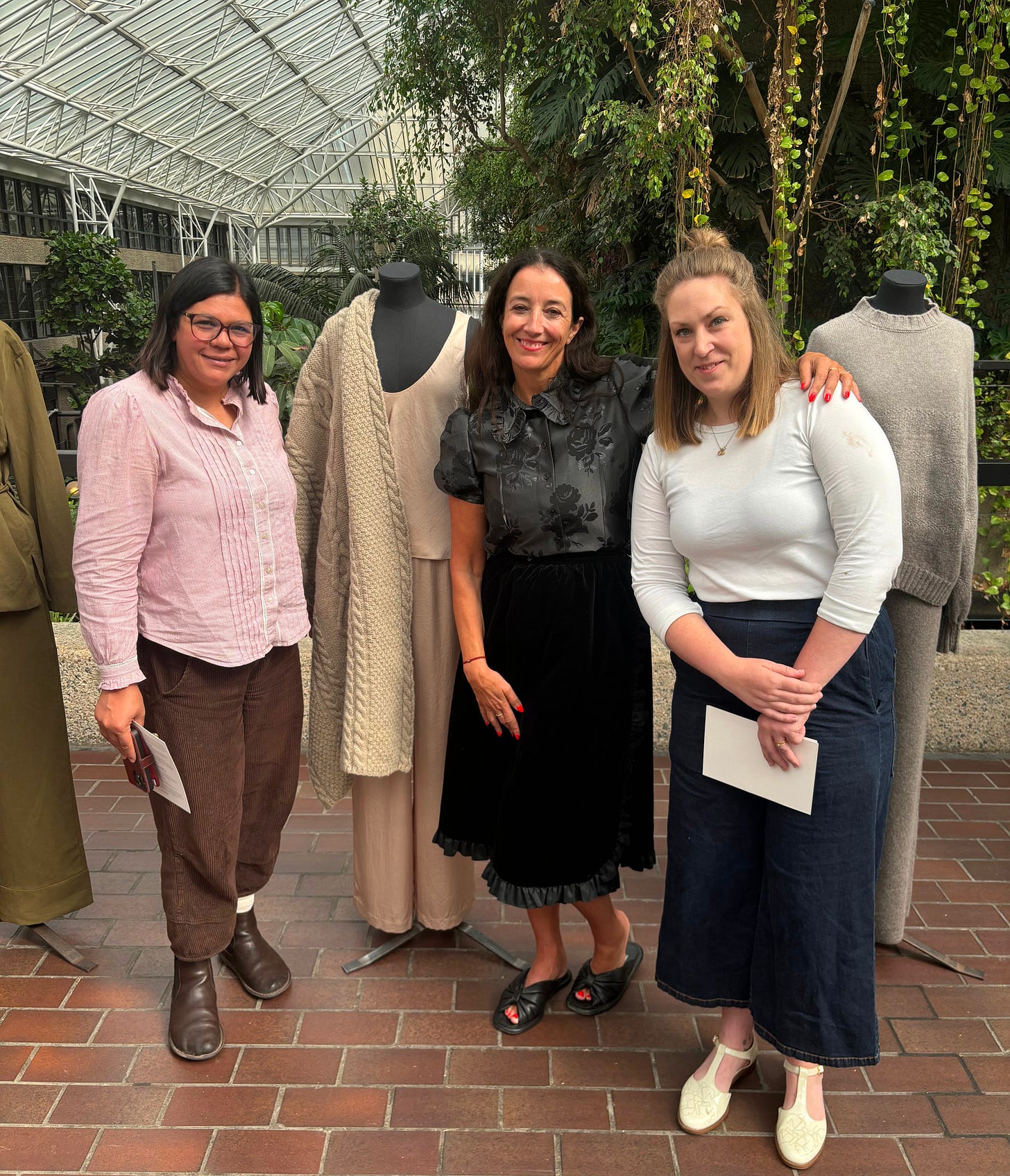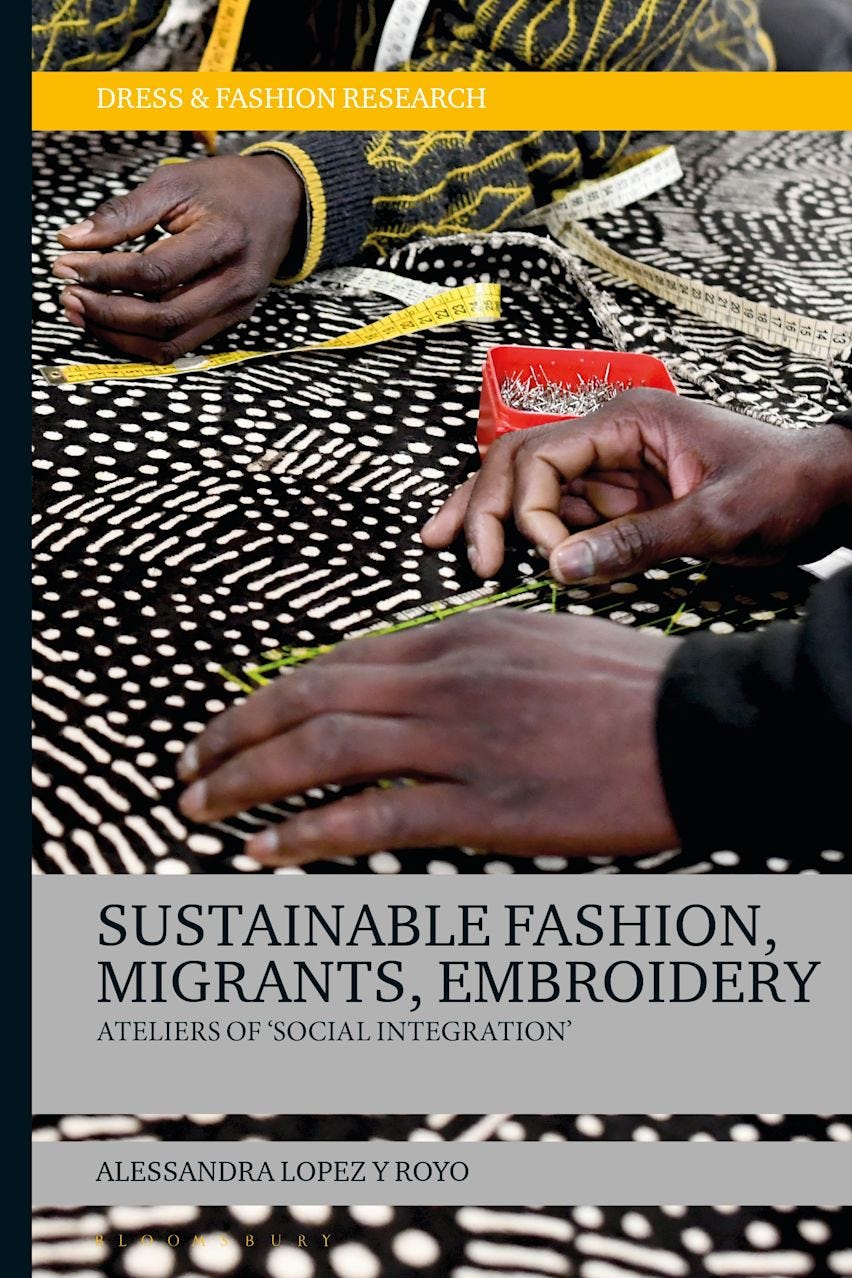Fashion's Green Frontier: Reflections from the Recycling Expo and Optimism for Sustainability
Also this week: Introducing the Fashion Roundtable Library
Calling All Fashion Professionals! We need your input
Fashion Roundtable is currently working on a report addressing Brexit’s impact on the fashion sector, which is set to be presented to both the UK and EU governments as part of a wider report by the Independent Commission on UK-EU Relations.
This is an invaluable opportunity to ensure that the voice of the fashion industry is heard in policy spaces and to advocate for the changes needed for the British fashion sector to thrive. It also comes at a critical time as we approach the 2025 renegotiation of the UK-EU relationship.
We are seeking industry input by Friday, 25th October. Use the link here to fill in a short survey, or email alix.coombs@fashionroundtable.co.uk with your thoughts.

Celebrating Wool Month with the Great British Wool Revival podcast
This October marks Wool Month, which celebrates all things British Wool.
For this episode of the Front Row to Front Bench podcast, Tamara Cincik speaks with Harriet Fletcher-Gilhuys, Zoe Fletcher and Maria Benjamin, the team behind our collaboration with The King's Foundation and YNAP for the Modern Artisan Collection, the Great British Wool Revival.
The discussion includes the background into how the team got together and why there is a need for a Great British Wool Revival.
Fashion's Green Frontier: Reflections from the Recycling Expo and Optimism for Sustainability
Attending the Recycling Expo in London last week was an eye-opener, especially from the perspective of the fashion industry, which is becoming increasingly intertwined with the future of sustainability and resource management. The event, held at the Excel Centre, brought together innovators, policymakers, and industry leaders—all focused on one pressing question: how can we turn waste into a resource and build a more sustainable future? For those of us in fashion, the potential solutions on display were both inspiring and a call to action.
Why Fashion Needs a Bigger Presence at Recycling Events
The recycling industry has much to teach fashion, particularly around how we think about waste. Fashion is one of the largest polluters globally, and recycling holds the key to reducing the environmental impact of this multi-trillion-pound sector. Yet, at events like the Recycling Expo, the presence of the fashion sector was noticeably underrepresented. This is a missed opportunity. As fashion grapples with issues like fast fashion, textile waste, and unsustainable practices, being more actively involved in recycling and circular economy discussions is crucial. The Expo highlighted advanced technologies, new policies, and industry collaborations that fashion should be at the heart of.
The Power of AI in Recycling
One of the major themes at this year’s Expo was how artificial intelligence (AI) is revolutionising recycling processes. AI technologies, like machine learning, can now sort waste more effectively and detect materials at a granular level, drastically improving recycling efficiency. For fashion, this means that AI could be a game-changer in sorting textiles and recycling garments into usable fibres. Companies like Matoha showcased how their AI-powered solutions identify different types of textiles, making it easier to process them correctly. For fashion brands looking to embrace circular economy practices, AI offers the potential to close the loop on textile waste.
Waste as a Resource and Extended Producer Responsibility (EPR)
Another key takeaway from the Expo was the growing focus on treating waste not just as a disposal issue but as a valuable resource. The concept of Extended Producer Responsibility (EPR) is gaining momentum, particularly in Europe, where manufacturers are increasingly being held accountable for the end-of-life of their products. This is critical for fashion. Under EPR schemes, brands would be responsible for the disposal or recycling of garments they produce, encouraging them to design with longevity and recyclability in mind. At the Expo, it was clear that fashion brands that embrace EPR and start viewing waste as a resource will be better positioned for future regulations and consumer demands for sustainability.
Harmonising UK-EU Relations
One of the discussions that resonated with me was the need for stronger harmonisation between UK and EU recycling standards. Post-Brexit, UK-based fashion brands have struggled with the fragmented regulations between the two regions. Harmonising recycling practices and trade policies is essential for fashion brands that rely on cross-border supply chains. The Expo showcased how industries are pushing for clearer, more streamlined regulations that will allow for easier movement of recycled materials and more collaboration between UK and EU partners. For fashion, this means greater access to sustainable materials and recycling technologies that can be used across markets.
Plastics, Sustainability, and Emerging Trends
Plastics remain one of the most concerning environmental issues, and the fashion industry is a significant contributor due to the widespread use of synthetic fibres like polyester. However, at the Expo, there were emerging trends in how plastics are being handled—particularly in recycling and upcycling. There were exciting developments in creating bio-based plastics and innovations in reusing ocean plastics. Fashion can learn from these advancements. If we integrate recycled plastics into textile production or reduce plastic use altogether, we can make meaningful strides towards sustainability.
Matoha’s Impact on Fashion and Recycling
Among the most impressive presentations at the Expo was that of Matoha, whose innovations in textile recycling have the potential to revolutionise the way the fashion industry manages waste. During the event, we were given a live demonstration by Emmeline May, who showcased Matoha’s infrared scanners—capable of identifying and sorting different textiles with remarkable speed and precision. In mere seconds, the scanner could distinguish between fibres, allowing for accurate sorting that would otherwise take much longer using traditional methods. This technology significantly enhances the efficiency of textile recycling, ensuring that garments can be accurately sorted and repurposed, thus reducing the volume of waste that ends up in landfills.
For fashion brands, particularly those striving to adopt circular economy models, Matoha’s technology presents a practical solution to one of the industry’s most challenging problems: recycling mixed textiles. By facilitating quicker and more precise sorting, brands can ensure that their used materials are correctly processed, making it easier to reintroduce recycled fibres into the production chain. Matoha’s demonstration was a powerful reminder of how cutting-edge technology can pave the way for a more sustainable future in fashion.
Looking Forward: Fashion’s Role in a Sustainable Future
The Recycling Expo was a reminder that sustainability in fashion is not only achievable but also necessary. The innovations in AI, recycling technologies, and policy frameworks are here. What we need now is for the fashion industry to take a more active role in these discussions, bringing our specific challenges and solutions to the table. Attending events like the Recycling Expo is just one step, but it’s clear that collaboration across industries is the way forward. The fashion industry must become a leader in sustainability, not a follower. The technologies and policies are in place—we just need to fully commit to this transformation.
In conclusion, it’s time for fashion to step up and take a bigger role in sustainability conversations. The tools are here, and the potential for a more sustainable future is within reach. If we embrace these technologies and collaborate with other sectors, we can create a fashion industry that not only produces beautiful clothing but does so with respect for the planet and future generations.
Introducing The Fashion Roundtable Library!
Each week, we’ll be spotlighting a book that inspires, educates, and deepens our understanding of fashion’s impact on the world. From sustainability to social change, these recommendations will feature voices shaping the future of the industry. You’ll be able to find all these recommendations in the new ‘Library’ section on our Substack.
For our first pick, we’re delighted to recommend Sustainable Fashion, Migrants, Embroidery: Ateliers of 'Social Integration' by Alessandra Lopez y Royo.
The book takes readers on an eye-opening journey to discover the community-driven 'solidarity ateliers' in both the Global North and South. These artisans are offering an alternative to fast fashion by fostering collaboration and knowledge-sharing that integrate with local communities. Through fieldwork in Morocco, Southern Italy, and London, Lopez y Royo uncovers how these spaces empower migrants and refugees, while challenging traditional ideas of empowerment and social integration. This thought-provoking book offers a fresh perspective on how slow fashion can drive both social change and sustainability.
Thanks Alessandra for sharing your work with us!






